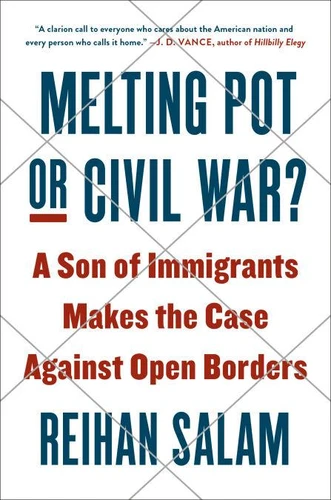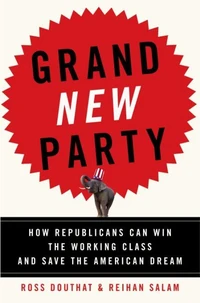Melting Pot or Civil War?. A Son of Immigrants Makes the Case Against Open Borders
Par :Formats :
Disponible dans votre compte client Decitre ou Furet du Nord dès validation de votre commande. Le format ePub protégé est :
- Compatible avec une lecture sur My Vivlio (smartphone, tablette, ordinateur)
- Compatible avec une lecture sur liseuses Vivlio
- Pour les liseuses autres que Vivlio, vous devez utiliser le logiciel Adobe Digital Edition. Non compatible avec la lecture sur les liseuses Kindle, Remarkable et Sony
- Non compatible avec un achat hors France métropolitaine
 , qui est-ce ?
, qui est-ce ?Notre partenaire de plateforme de lecture numérique où vous retrouverez l'ensemble de vos ebooks gratuitement
Pour en savoir plus sur nos ebooks, consultez notre aide en ligne ici
- Nombre de pages224
- FormatePub
- ISBN978-0-7352-1628-0
- EAN9780735216280
- Date de parution25/09/2018
- Protection num.Adobe DRM
- Taille786 Ko
- Infos supplémentairesepub
- ÉditeurSentinel
Résumé
Long before Covid-19 and the death of George Floyd rocked America, Reihan Salam predicted our current unrest--and provided a blueprint for reuniting the country."Tthe years to come may see a new populist revolt, driven by the resentments of working-class Americans of color." For too long, liberals have suggested that only cruel, racist, or nativist bigots would want to restrict immigration. Anyone motivated by compassion and egalitarianism would choose open, or nearly-open, borders-or so the argument goes.
Now, Reihan Salam, the son of Bangladeshi immigrants, turns this argument on its head. In this deeply researched but also deeply personal book, Salam shows why uncontrolled immigration is bad for everyone, including people like his family. Our current system has intensified the isolation of our native poor, and risks ghettoizing the children of poor immigrants. It ignores the challenges posed by the declining demand for less-skilled labor, even as it exacerbates ethnic inequality and deepens our political divides.
If we continue on our current course, in which immigration policy serves wealthy insiders who profit from cheap labor, and cosmopolitan extremists attack the legitimacy of borders, the rise of a new ethnic underclass is inevitable. Even more so than now, class politics will be ethnic politics, and national unity will be impossible. Salam offers a solution, if we have the courage to break with the past and craft an immigration policy that serves our long-term national interests.
Rejecting both militant multiculturalism and white identity politics, he argues that limiting total immigration and favoring skilled immigrants will combat rising inequality, balance diversity with assimilation, and foster a new nationalism that puts the interests of all Americans-native-born and foreign-born-first.
Now, Reihan Salam, the son of Bangladeshi immigrants, turns this argument on its head. In this deeply researched but also deeply personal book, Salam shows why uncontrolled immigration is bad for everyone, including people like his family. Our current system has intensified the isolation of our native poor, and risks ghettoizing the children of poor immigrants. It ignores the challenges posed by the declining demand for less-skilled labor, even as it exacerbates ethnic inequality and deepens our political divides.
If we continue on our current course, in which immigration policy serves wealthy insiders who profit from cheap labor, and cosmopolitan extremists attack the legitimacy of borders, the rise of a new ethnic underclass is inevitable. Even more so than now, class politics will be ethnic politics, and national unity will be impossible. Salam offers a solution, if we have the courage to break with the past and craft an immigration policy that serves our long-term national interests.
Rejecting both militant multiculturalism and white identity politics, he argues that limiting total immigration and favoring skilled immigrants will combat rising inequality, balance diversity with assimilation, and foster a new nationalism that puts the interests of all Americans-native-born and foreign-born-first.
Long before Covid-19 and the death of George Floyd rocked America, Reihan Salam predicted our current unrest--and provided a blueprint for reuniting the country."Tthe years to come may see a new populist revolt, driven by the resentments of working-class Americans of color." For too long, liberals have suggested that only cruel, racist, or nativist bigots would want to restrict immigration. Anyone motivated by compassion and egalitarianism would choose open, or nearly-open, borders-or so the argument goes.
Now, Reihan Salam, the son of Bangladeshi immigrants, turns this argument on its head. In this deeply researched but also deeply personal book, Salam shows why uncontrolled immigration is bad for everyone, including people like his family. Our current system has intensified the isolation of our native poor, and risks ghettoizing the children of poor immigrants. It ignores the challenges posed by the declining demand for less-skilled labor, even as it exacerbates ethnic inequality and deepens our political divides.
If we continue on our current course, in which immigration policy serves wealthy insiders who profit from cheap labor, and cosmopolitan extremists attack the legitimacy of borders, the rise of a new ethnic underclass is inevitable. Even more so than now, class politics will be ethnic politics, and national unity will be impossible. Salam offers a solution, if we have the courage to break with the past and craft an immigration policy that serves our long-term national interests.
Rejecting both militant multiculturalism and white identity politics, he argues that limiting total immigration and favoring skilled immigrants will combat rising inequality, balance diversity with assimilation, and foster a new nationalism that puts the interests of all Americans-native-born and foreign-born-first.
Now, Reihan Salam, the son of Bangladeshi immigrants, turns this argument on its head. In this deeply researched but also deeply personal book, Salam shows why uncontrolled immigration is bad for everyone, including people like his family. Our current system has intensified the isolation of our native poor, and risks ghettoizing the children of poor immigrants. It ignores the challenges posed by the declining demand for less-skilled labor, even as it exacerbates ethnic inequality and deepens our political divides.
If we continue on our current course, in which immigration policy serves wealthy insiders who profit from cheap labor, and cosmopolitan extremists attack the legitimacy of borders, the rise of a new ethnic underclass is inevitable. Even more so than now, class politics will be ethnic politics, and national unity will be impossible. Salam offers a solution, if we have the courage to break with the past and craft an immigration policy that serves our long-term national interests.
Rejecting both militant multiculturalism and white identity politics, he argues that limiting total immigration and favoring skilled immigrants will combat rising inequality, balance diversity with assimilation, and foster a new nationalism that puts the interests of all Americans-native-born and foreign-born-first.




